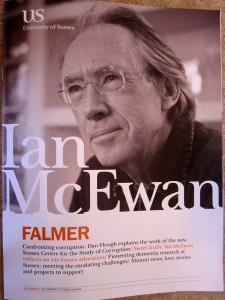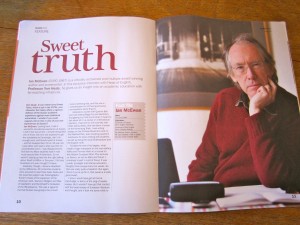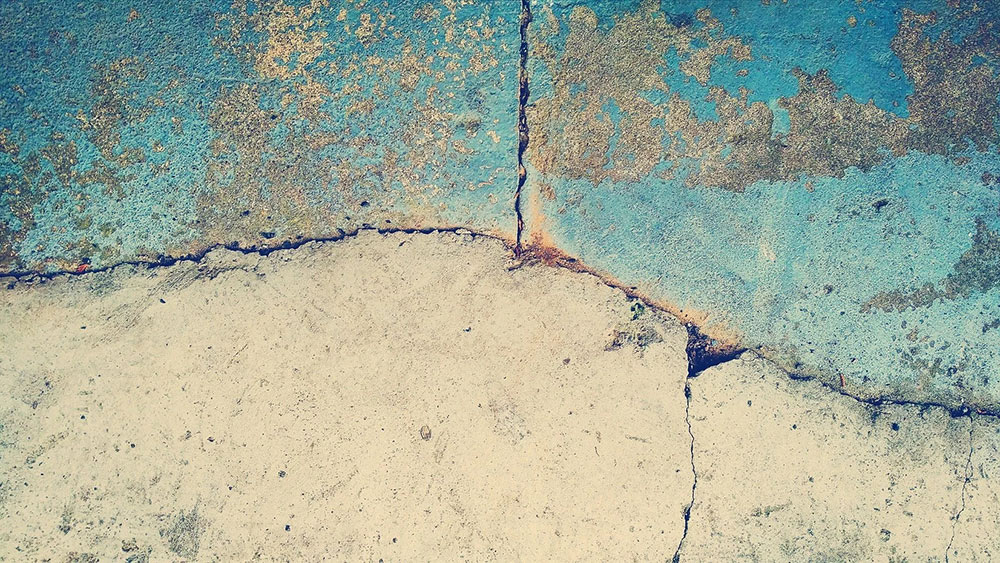 Ian McEwan was interviewed in his university magazine this month, talking about his early influences and how he became a writer. Since it’s an interesting story, and some of you may possibly not have seen the latest copy of Falmer: The University of Sussex Magazine, I thought I’d summarise it here.
Ian McEwan was interviewed in his university magazine this month, talking about his early influences and how he became a writer. Since it’s an interesting story, and some of you may possibly not have seen the latest copy of Falmer: The University of Sussex Magazine, I thought I’d summarise it here.
Failure and disappointment
The most interesting part, to me, is that the career of such an illustrious writer began with failure and disappointment. In fact, the failure and disappointment turned out to be crucial in his development as a writer. It started with being expected to go to Cambridge, not doing enough work and failing to get in. Sussex was a very different and difficult experience.
For an 18-year-old, I was rather well-read in what was then an uncontested canon. I was disappointed to find that my fellow students hadn’t read much beyond their A-level texts. So we weren’t staying up late into the night talking about Wyatt or Milton or Tennyson. I felt very frustrated and even thought I’d leave.
A broader view
But then he discovered life beyond the canon. The English Literature course at Sussex was very broad, introducing him to new ideas in historiography, history and art theory, and even letting him study “quantum mechanics for know-nothing arts students”. He read Kafka and Thomas Mann in a course on the Modern European Mind, and immersed himself in the writings of Freud, and found himself changing.
[At Cambridge] I wouldn’t have got that contact with the broad sweep of European literature and thought, and it took me some while to appreciate fully the extent to which my mind had been reordered, as it were; wrenched away from the parochial, Leavisite criticism that dominated English literary studies then. Even now I continue to draw on that bold, optimistic, very 60s notion of a new map of learning.
So if McEwan hadn’t failed at first, perhaps he wouldn’t have gone on to be the writer he is today. Perhaps he wouldn’t be a writer at all – maybe he’d have become immersed in Leavisite criticism and be the world expert on an obscure corner of English literature. It’s impossible to say, of course, but it’s an interesting question.
Of course, we have to question our sources. McEwan is hardly likely to say in an interview with the University of Sussex magazine that he got nothing from his time there. On the other hand, he really has no reason to lie – if he didn’t get much out of Sussex, he could have just declined the interview. It’s not as if he needs the publicity.
Becoming a writer
McEwan started writing in his third year, influenced by his reading of Bruno Schulz, Kafka, Joyce, Forster and Woolf.
Here was this great conversation of civilisation going on, and you could join it; you didn’t have to just be a reader of it. I think most writers become writers through reading, through pleasure in reading.
 His first attempt at writing was a cinema adaptation of Tonio Kroger by Thomas Mann, followed by a “terrible play” which he submitted unsuccessfully to the University drama society.
His first attempt at writing was a cinema adaptation of Tonio Kroger by Thomas Mann, followed by a “terrible play” which he submitted unsuccessfully to the University drama society.
In his third year he decided that he didn’t want a job. He got a pamphlet about a job in the diplomatic service, and saw a table with ages from 21 to 65 on one axis and salary expectations on the other.
You could read off the next 40 years. My heart sank. It wasn’t that the salary was low; but seeing a whole life set out like the mileage between two towns, that confirmed for me that I didn’t want a career. It was, I suppose, also the spirit of the times, to cut loose. Writing represented freedom to me.
By the way, if anyone’s wondering how I came across a copy of Falmer magazine, it’s because my parents went to the University of Sussex, also in the 1960s, and passed it along to me because they thought I’d be interested in an article about Ian McEwan’s early days as a writer. I was, and I hope you were too.
What’s your favourite McEwan novel? Let me know in the comments. Or feel free to start a learned discussion on Wyatt, Milton and Tennyson if you prefer 😉



There are 9 comments
On what you’ve said about reliability, I have to agree. What he’s said about the other students does, in a way, suggests that perhaps Sussex wasn’t the best place for him, or was even below him, in the context of his background and opinion. But then he’s acknowledged that he did learn a lot. I’ve not read his work yet, so can’t comment there, but I like what he’s said about careers; I suppose to some the pamphlet would have been intriguing but it sounds a bit too planned.
Hi Charlie
Yes, I think he did feel it was below him at first. It did sound genuine, though, when he talked about what he got from being there.
The pamphlet sounds terrifying! A bit like an actuarial table 🙂 When I was 21, I didn’t even want to plan a few weeks into the future, let alone 45 years!
I have not read McEwan but he has been on my to read list for years.
What McEwan says that he got out of Sussex sounds plausible. I think that a bit of quantum mechanics can help anyone understand the universe!
You know, Brian, I wish I’d done some “quantum mechanics for know-nothing arts students” when I was at university! I believe that in the US and some other countries, there tend to be more courses in different subjects. In the UK, unfortunately, you usually just stick to your chosen subject – the Sussex course sounds like an exception. I agree, that sort of thing definitely helps you understand the universe!
I loved going to Brighton uni, but this really makes me wish I had been able to get into Sussex – but maybe Brighton has introduced and worked for me the way sussex did for him.
Without Brighton uni I certainly don’t think I would be the reader I am today; loving books definitely came from there – I would be some 3rd grade History grad for sure.
Absolutely love this man, I’ve only really read The Comfort of Strangers and some short stories, but I find him so interesting and intelligent. He really is fighting working conformity – I completely understand that feeling of looking at a work life panned out and feeling rage and despair.
I only wish I had his confidence and bravery – but blogging doesn’t really throw up the same opportunities and I am not sure I have the same talent. (Apologies, that was a little ‘woe is me’.)
Hi Alice
Yes, it could well be that Brighton worked the same way for you. He went to Sussex in the early days, only a few years after it was founded, and so the courses were fresh and radical in their design. I don’t know if it’s still that way today. The important thing is not so much the course itself, but the way in which university encouraged/discouraged you from reading widely and developing a broad, engaged mind. Sounds as if Brighton had a good effect on you, so job done! For me, both school and university education was very narrow, and I developed my love of books completely separately.
I just finished Sweet Tooth and really enjoyed it, although Atonement is my favourite McEwan. I’d like to try some of his early stuff, which I’ve heard is a lot darker.
Don’t worry, your comment didn’t come across as ‘woe is me’ 🙂 It is really hard to break away from that working conformity. It’s taken me 15 years and I’ve only just got to the point where I can write full-time. I don’t know much about McEwan’s path to publishing, but I doubt whether it was as easy as it sounds in the article. Most writers tend to gloss over the struggles and the crap jobs and the worries over paying the rent! There are a few who get picked up early in life, get a huge advance and live happily ever after, but they’re a tiny minority. Most of us go through a lot of mundane hopelessness and bleak, bleak reality (to borrow a couple of phrases from a blog I like) before one day, maybe, making enough to put food on the table, and one day much later, maybe, making it to the McEwan level of fame and literary accomplishment. Personally I don’t think it’s so much about confidence and bravery – more like stubbornness and a willingness to tolerate material discomfort.
Writers’ Meetings take place weekly, see http://www.sussexstudent.com/media/events for times & venues.